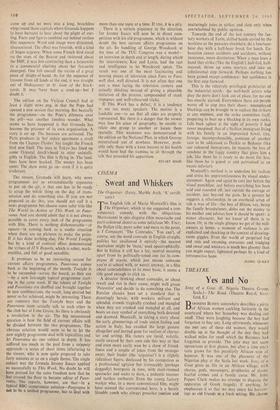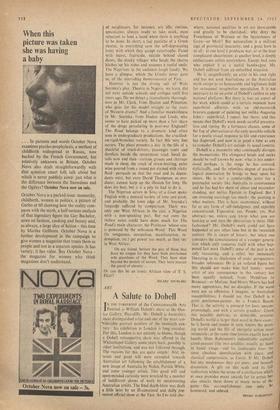THEATRE
Yes and No
Song of a Goat. (E. Nigeria Theatre Group, Scala.)—The Road. (Theatre Royal, Strat- ford, E.) BARONESS BLIXEN somewhere describes a party of African women cackling furiously in the courtyard where her houseboy was dealing out snuff. They were laughing because the boy had forgotten to buy any. Long afterwards, whenever she met any of these old women, they would double up at the thought of the day they had walked miles for snuff which' the Baroness had forgotten to provide. The joke may not seem uproarious at first glance, but after a time one's taste grows for this peculiarly African vein of humour. It was one of the pleasures of the Nigerian play at the Scala last week. SOlig of a Goat gives us life in an African village, with chorus, gods, messengers, prophecies of doom, fearful crimes and a family curse. Mr. John Pepper Clark makes no attempt to disguise the apparatus of Greek tragedy; if anything, he emphasises it so that we may enjoy his borrow- ings as old friends in a fresh setting. His 'chorus of neighbours, for instance, are idle, curious, speculative, always ready to take stock, most reluctant to lend a hand when there is anything to be done. In short, a fair pastiche of a Greek chorus, in everything save the self-deprecating irony with which they accept catastrophe. Faced with incest, fratricide, suicide behind closed doors, the stocky villager who heads the chorus hitches up his robes and assumes a rueful smile. The Nigerians in the audience laugh loudly. We have a glimpse, which the Greeks never gave us, of the overriding humorousness of Fate. Humour is not the strong suit of, Wok Soyinka's play. Theatre in Nigeria, we learn, did not exist outside schools and colleges until five years ago. Do we detect a transatlantic thorough- ness in Mr. Clark, from lbadan and Princeton, who goes for his model straight to the roots of Western drama? And a familiar mawkishness in Mr. Soyinka, from lbadan and Leeds, who seems to have picked up more than a fair share of the dregs percolating in post-war England? The Road belongs to a dramatic kind often seen in undergraduate productions, the crucified- on-rigid-branches variety. In fact this very line occurs. The plays presents a day in the life of a shackful of truck-drivers, passenger touts and derelicts beside the eponymous road. Small de- tails now and then--curious groans and chirrups made in sleep, the creak of straw-matting, palm wine poured from a round pot stained with sticky fluid--persuade us that the road and its depen- dants exist, but even David Thompson, as pro- ducer, cannot keep up the illusion for long. He does his best, but it is a pity he had to do it.
The Nigerian actors in Song of a Goat spoke • English with a musical variety of tone and pitch, and probably the keen edge of Mr. Soyinka's language suffered by comparison. There was only one West African in the cast, a Nigerian with a non-speaking part. But not even the richest voice could have done much for The Road's main character, the Professor 'whose arm is powered by the unbroken Word.' This Word (its vengeance, usurpation, manifestation, re- demption, etc.) get power too much, as they say in West Africa:
Oh my friend, beware the pity of those that have no tongue for they have been proclaimed sole guardians of the Word. They have slept beyond the portals of secrets. They have pierced the guard of eternity . .
Or can this be an ironic African view of T. S. Eliot?
HILARY SPURLING



































 Previous page
Previous page